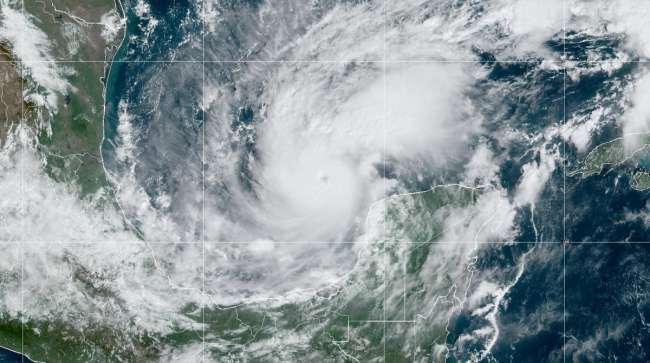Hurricane Milton Is Now a Disastrous Category 5 Storm

[Stay on top of transportation news: Get TTNews in your inbox.]
Milton strengthened into a catastrophic Category 5 hurricane as it bears down on Florida’s west coast, where residents have begun to flee inland in a region still recovering from Helene’s devastation.
Milton’s top winds have reached 160 miles per hour, up from 90 mph at 1 a.m. local time Oct. 7, the U.S. National Hurricane Center said in a special update. This makes Milton one of the most powerful storms produced in the Atlantic this year, rivaled only by Hurricane Beryl, which raked Texas, Mexico and the Caribbean in July.
With winds this intense, Milton is capable of collapsing homes, flattening trees and triggering power outages that could last weeks to months. It’s difficult for hurricanes to maintain their maximum strength for long, however, so Milton may weaken as it nears Florida. Only four Category 5 hurricanes have hit the U.S. mainland, including Michael, which struck Florida’s Panhandle in 2018.
Widespread electricity outages are likely and a small shift in Milton’s trajectory can determine whether it strikes a densely populated area or not, said Florida Governor Ron DeSantis, who has declared an emergency in 51 counties.
“Please, if you are in the Tampa Bay area, you need to evacuate,” Kevin Guthrie, the director of the Florida Division of Emergency Management, said at a briefing Oct. 7. “Drowning deaths due to storm surge are 100% preventable if you leave.”
Hurricane #Milton Advisory 10A: Milton Explosively Intensifies With 175-Mph Winds. Residents in Florida Are Urged to Follow the Advice of Local Officials. https://t.co/tW4KeGe9uJ — National Hurricane Center (@NHC_Atlantic) October 7, 2024
It isn’t clear exactly where Milton will make landfall. Various computer forecast models are at odds, and the hurricane center says errors of as much as 100 miles are possible in the days before a storm comes ashore. Milton will likely make landfall between 5 p.m. and 9 p.m. Oct. 9, said Tyler Roys, a meteorologist with AccuWeather Inc.
“Milton’s remarkable rapid intensification is continuing,” Eric Blake, a forecaster at the hurricane center, wrote in his outlook. Only two other hurricanes — Wilma in 2005 and Felix in 2007 — have strengthened as quickly, he added.
Hurricane Milton’s jump in strength comes from hot Gulf of Mexico waters that also intensified the deadly Helene less than two weeks ago. Roys said a ridge of high pressure that’s setting temperature records in Phoenix and across the Southwest is helping steer Milton on an unusual track from west to east across the Gulf. No storm has blazed such a path since 1900.
10/07/24 11am Major Hurricane Milton Update
⚠️Now a Category 5 Hurricane
⚠️If the storm stays on the current track, it will be the worst storm to impact the Tampa area in over 100 years.
⚠️Please evacuate if told to do so.
⚠️Complete all prep before tomorrow night. #flwx pic.twitter.com/Cq9tJsfr2A — NWS Tampa Bay (@NWSTampaBay) October 7, 2024
Milton will likely cause between $40 billion to $75 billion in damages and losses, Chuck Watson, a disaster modeler at Enki Research, said in an X post.
In addition to packing ferocious winds, Milton is forecast to push a wall of water on shore than may reach as high as 12 feet in Tampa Bay and along the coast, including Bradenton and Sarasota, the hurricane center said.
“There is an increasing risk of life-threatening storm surge from Milton for portions of the west coast of the Florida Peninsula beginning [the night of Oct. 8 or early Oct. 9],” the hurricane center said. “Residents should follow any advice given by local officials and evacuate if told to do so.”
Want more news? Listen to today's daily briefing above or go here for more info
NASA and SpaceX have postponed the Oct. 10 launch of the agency’s multibillion-dollar Europa Clipper mission to explore Jupiter’s icy moon. The agency and SpaceX have launch opportunities until Wednesday, Nov. 6.
Milton will be the second major storm to strike Florida in less than two weeks and the fifth hurricane to hit the U.S. this year. At least 227 people died when Hurricane Helene struck Florida’s Big Bend area in late September and then spread flooding rains into Appalachian Mountains, wreaking havoc across the region. Nearly half of all hurricane deaths come from drowning caused by storm surge and inland flooding.
Milton threatens to inflict wind damage in the northern two-thirds of Florida’s citrus belt this week, according to Commodity Weather Group. For the second time in two weeks, Amtrak has canceled some trains in Florida and halted others at Jacksonville, the federally funded rail carrier said.




